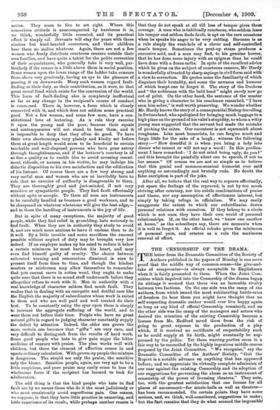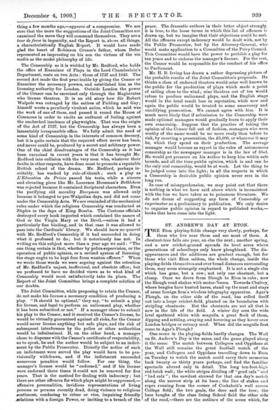THE CENSORSHIP OF THE DRAMA.
THE letter from the Dramatic Committee of the Society of Authors published in the papers of Monday is one more proof that the middle way of common-sense—the give-and- take of compromise—is always acceptable to Englishmen when it is fairly presented to them. When the Joint Com- mittee which inquired into the Censorship of the drama began its sittings it seemed that there was an incurable rivalry between two factions. On the one side was the camp of the authors, from which issued the most exhilarating battle-cries of freedom (to hear them you might have thobght that no self-respecting dramatic author would ever live happy again so long as any kind of official Censorship remained), and on the other side was the camp of the managers and actors who desired the retention of the existing Censorship because a license from Mr. Redford saved them from the risk of going to great expense in the production of a, play which, if it received no certificate of respectability such as he could supply at its birth, might eventually be sup- pressed by the police. Yet these warring parties seem in a fair way to be reconciled by the highly ingenious middle course proposed by the Joint Committee. " We recognise," say the Dramatic Committee of the Authors' Society; "that the Report is a notable advance on anything that has appeared before ; and we appreciate its virtually complete admission of our case against the existing Censorship and its adoption of our suggestions for preventing the abuse as an instrument of censorship of the power of licensing theatres." They note, too, with the greatest satisfaction that one license for all places of amusement—for music-halls as well as theatres— has been recommended. On certain points they have some serious, and, we think, well-considered, suggestions to make ; but the fact remains that they do what seemed the impossible thing .a few months ago,—approve of a compromise. We are sure that the more the suggestions of the Joint Committee are examined the more they will commend themselves. They are a tour de force in ingenuity, and the Report is, above all things, a characteristically English Report. It would have made glad the heart of Robinson Crusoe's father, whom Defoe represented as impressing on his son the virtues of the via media as the model philosophy of life.
The Censorship as it is wielded by Mr. Redford, who holds the office of Examiner of Plays in the Lord Chamberlain's Department, rests on two Acts : those of 1737 and 1843. The second Act made the first practicable by giving the Censor or Examiner the necessary powers, and established him as the licensing authority for London. Outside London the power of the Censor can be exercised only through the Magistrates who license theatres. It is an old story how Sir Robert Walpole was outraged by the satires of Fielding and Gay ; himself wrote a peculiarly virulent satire, which he said was the work of one of them, and passed it round the House of Commons in order to excite an outburst of feeling against the unchecked insolence of playwrights. That was the origin of the Act of 1737, but the Censorship has always been a lamentably irresponsible office. We fully admit the need of some kind of Censorship in the interests of common decency, but it is quite certain that the required effect never has been, and never could be, produced by a secret and arbitrary power. One of the chief disadvantages of the Censorship as it has been exercised in recent years is that it has brought Mr. Redford into collision with the very men who, whatever their faults in other respects, have done most to promote a reputable British school of the drama. Mr. Redford, perhaps in- evitably, has worked by rule-of-thumb ; such a play as L'Education do Prince passed his tests, while a sincere and elevating piece like Mr. Laurence Housman's Bethlehem was rejected because it contained Scriptural characters. Even the purifying old morality Everyman was allowed only because it belonged to pre-Walpolian days, and did not come under the Censorship Acts. We are reminded of the mechanical rules under which the religious Censorship was conducted at Ntsples in the days of King Bombe. The Customs officials destroyed every book imported which contained the names of God or the Virgin Mary or the Devil,—unless it had a particularly fine binding, and in that case it was allowed to pass into the Cardinals' library. We should have no quarrel with Mr. Redford's Censorship if it had succeeded in doing what it professed to do ; but it notoriously has not. In writing on this subject more than a year ago we said : "The one thing certain is that, whether by police supervision, or the operation of public opinion, or a revised system of licensing the stage ought to be kept free from wanton offence." When we wrote those words we were arguing against the retention of Mr. Redford's unjust, ineffectual, and obsolete office; but we professed to have no decided views as to what kind of Censorship would most satisfactorily take its place. The Report of the Joint Committee brings a complete solution of our doubts.
The Joint Committee, while proposing to retain the Censor, do not make his license a necessary condition of producing a play. " It should be optional," they say, "to submit a play for license, and legal to perform an unlicensed play, whether it has been submitted or not." If a manager chose to submit his play to the Censor, and it received the Censor's license, he would be virtually guaranteed against all risks, for the Censor would never license anything but safe plays, and the risk of subsequent interference by the police or other authorities would be infinitesimal. If, on the other hand, a manager chose to dispense with the Censor's certificate of respectability, so to speak, he and the author would be subject to an indict- ment by the Public Prosecutor. Directly the notice of such an indictment were served the play would have to be pro- visionally withdrawn, and if the indictment succeeded numerous penalties would follow. For one thing, the manager's license would be "endorsed," and if his license were endorsed three times it could not be renewed for five years. That is the method for dealing with indecency ; but there are other offences for which plays might be suppressed,— offensive personalities, invidious representations of living persons or persons recently dead, doing violence to religions sentiment; conducing to crime. or vice, impairing friendly arelations with a foreign Power, or inciting to a breach of the peace. The dramatic authors in their letter object strongly, it is true, to the loose terms in which this list of offences drawn up, but we imagine that their objections could be met. All the offences except indecency would be dealt with, not by the Public Prosecutor, but by the Attorney-General, who would make application to a Committee of the Privy Council. This Committee would have the power to prohibit a play for ten years and to endorse the manager's license. For the rest, the Censor would be responsible for the conduct of his office to Parliament.
Mr. H. B. Irving has drawn a rather depressing picture of the probable results of the Joint Committee's proposals. He thinks a class of endorsed theatres would arise well known to the public for the production of plays which made a point of sailing close to the wind ; nine theatres out of ten would refuse to produce unlicensed plays, and the English stage would in the total result lose in reputation, while now and again the public would be treated to some unsavoury and unedifying prosecution. We cannot agree with him. It is much more likely that if submission to the Censorship were made optional managers would gradually learn to apply their own censorship. Suppose that the practice of taking the opinion of the Censor fell out of fashion, managers who were worthy of the name would be no more ready than before to risk, by courting a prosecution, the £5,000, or whatever it may be, which they spend on their production. The average manager would become as expert in the rules of autonomous • censorship as the newspaper manager is in the law of libel. He would put pressure on his author to keep bins within safe bounds, and all the time public opinion, which is and can be the only real censorship, would be at work. Let the thing to be judged come into the light; in all the respects in which a Censorship is desirable public opinion never errs in the long run.
In ease of misapprehension, we may point out that there is nothing in what we have said above which is inconsistent with the line we have taken as to poisonous literature. We do not dream of suggesting any form of Censorship or imprimatur as a preliminary to publication. We only desire to organise public opinion in regard to published works,— books that have come into the light.







































































 Previous page
Previous page